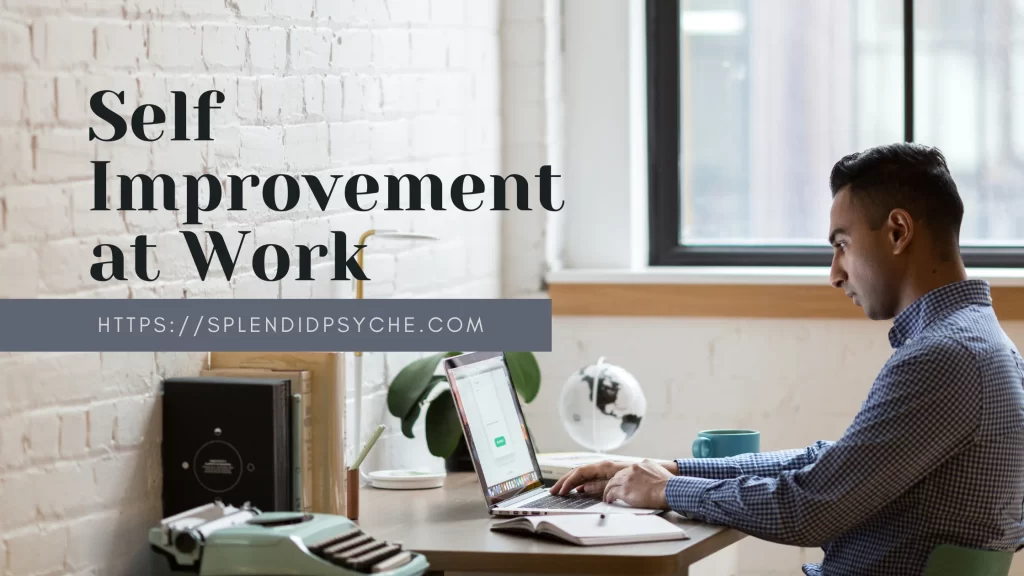The quest for self improvement at work stands as a beacon, guiding individuals toward personal and professional growth. In the bustling world of modern workplaces, where deadlines loom large and expectations soar high, there’s a constant pursuit of excellence. Whether you’re a seasoned professional or just starting out, investing in self improvement at work not only enhances your skills but also opens doors to new opportunities and challenges. Let’s delve into the realm of self improvement at work, exploring its significance, setting achievable goals, and exemplifying actionable strategies for transformative change.

Understanding Self Improvement at Work
Self improvement at work encompasses a holistic approach to refining one’s skills, mindset, and behavior within the professional realm. It involves a commitment to continuous learning, adaptability, and self-awareness. The journey toward self improvement at work is not a sprint but a marathon, requiring dedication, resilience, and a growth-oriented mindset.
Why Self Improvement at Work Matters
Embracing self improvement at work is akin to sharpening the tools in your professional toolkit. It empowers you to navigate challenges effectively, seize opportunities for advancement, and cultivate a fulfilling career journey. Moreover, by honing your skills and competencies, you become an invaluable asset to your organization, driving innovation, and contributing to collective success.
Setting Goals for Self Improvement at Work
Central to self improvement at work is the art of setting SMART goals — Specific, Measurable, Achievable, Relevant, and Time-bound. Let’s delve deeper into the concept of SMART goals and elaborate on each of its components:
SMART Goals: A Blueprint for Success
SMART goals provide a structured framework for goal-setting, ensuring that objectives are clear, achievable, and actionable. Let’s break down each component:
Specific
Specificity is the cornerstone of effective goal-setting. A specific aim eliminates all doubt by outlining exactly what you hope to accomplish. When setting a specific goal for self-improvement at work, it’s essential to answer the following questions:
- What exactly do I want to accomplish?
- Why is this goal important?
- What are the key outcomes I aim to achieve?
For instance, a specific goal can be “enhance public speaking abilities to confidently deliver presentations during team meetings,” as opposed to a general one like “improve communication skills.”
Measurable
Measurability enables you to track progress and evaluate success. A measurable goal establishes concrete criteria for assessing your achievements, providing a clear indication of whether you’re on track or need to adjust your approach. When defining a measurable goal, consider:
- How will I measure progress toward this goal?
- What specific metrics or indicators will I use to assess success?
Using the previous example, measurable criteria could include “delivering three successful presentations without relying on notes within the next three months” or “receiving positive feedback from colleagues and supervisors on presentation delivery.”
Achievable
An achievable goal is realistic and within your reach, considering your current skills, resources, and circumstances. While it’s important to set ambitious goals that challenge you to grow, they should also be attainable given the constraints of time, resources, and expertise. When evaluating goal achievability, ask yourself:
- Is this goal within my capability to accomplish?
- Do I have access to the tools and assistance I need?
- Are there any potential obstacles or limitations that may impede progress?
For instance, if you’re aiming to master a new software program, ensure that you have access to training materials, adequate time for practice, and support from colleagues or mentors to overcome challenges along the way.
Relevant
Relevance ensures that your goals align with your broader objectives and contribute to your professional growth and organizational priorities. A relevant goal is meaningful and directly relevant to your role, aspirations, and the overall mission of your workplace. To assess goal relevance, consider:
- Does this goal align with my career aspirations and organizational objectives?
- Will achieving this goal contribute to my professional development and enhance my value to the organization?
- Is this goal a priority given my current role and responsibilities?
For example, if your long-term career goal is to transition into a leadership role, setting a relevant goal could involve developing leadership skills, such as delegating tasks, providing constructive feedback, and fostering team collaboration.
Time-bound
Time-bound goals have a clear deadline or timeline for completion, providing a sense of urgency and accountability. By establishing a specific timeframe, you create a sense of focus and momentum, preventing procrastination and ensuring timely progress. When setting a time-bound goal, consider:
- When do I intend to achieve this goal?
- What is a realistic timeframe for completing each milestone or action step?
- How will I prioritize tasks and allocate time to work toward this goal?
For instance, if your goal is to enhance your project management skills, you might set a deadline to complete a project management certification course within the next six months or to apply newly acquired skills to a real project within a specified timeframe.
Implementing SMART Goals for Self Improvement at Work
By incorporating the SMART criteria into your goal-setting process, you create a roadmap for success and increase the likelihood of achieving meaningful results. When crafting SMART goals for self-improvement at work, consider the following tips:
- Start with the end in mind: Clearly define the desired outcome and work backward to identify the specific steps needed to achieve it.
- Break down larger goals into smaller milestones: Divide big objectives into manageable tasks or milestones, each with its own deadline and measurable criteria.
- Regularly review and adjust goals: Continuously monitor progress, celebrate successes, and make adjustments as needed based on changing circumstances or feedback.
- Stay flexible and adaptable: While SMART goals provide a structured framework, remain open to adaptation and iteration based on new insights or unforeseen challenges.
By setting SMART goals for self improvement at work, you empower yourself to take control of your professional development journey, maximize your potential, and achieve tangible results that propel your career forward. These goals serve as guiding beacons, charting a course for personal and professional development.
Examples of self improvement goals at work
- Enhancing Technical Skills: Set a goal to master a new software or technology relevant to your field within the next six months. Allocate dedicated time for learning and practical application to ensure proficiency.
- Improving Communication Skills: Aim to enhance your communication skills by attending workshops, seeking constructive feedback, and actively participating in team discussions. Set a target to deliver presentations confidently or improve your writing skills by drafting concise and impactful emails.
- Developing Leadership Abilities: Whether you’re in a managerial role or aspiring to leadership positions, focus on cultivating leadership competencies. This could involve mentoring junior colleagues, delegating tasks effectively, or undertaking leadership training programs.
- Prioritizing Time Management: In today’s fast-paced work environment, mastering time management is crucial. Set a goal to prioritize tasks efficiently, utilize time-blocking techniques, and minimize distractions to boost productivity and work-life balance.
- Fostering Emotional Intelligence: Recognize the importance of emotional intelligence in workplace interactions. Set a goal to enhance empathy, active listening, and conflict resolution skills, fostering harmonious relationships and a positive work environment.
Strategies for Self Improvement at Work
Achieving self improvement at work requires a proactive approach and a willingness to step out of your comfort zone. Here are actionable strategies to propel your journey toward personal and professional growth:
- Seek Feedback Regularly: Solicit feedback from peers, supervisors, and mentors to gain valuable insights into your strengths and areas for improvement. Embrace constructive criticism as a catalyst for growth and strive to incorporate feedback into your development journey.
- Embrace Lifelong Learning: Cultivate a thirst for knowledge and continuous learning. Stay abreast of industry trends, attend workshops, enroll in online courses, and participate in professional development programs to expand your skillset and stay ahead of the curve.
- Set Aside Time for Reflection: Carve out moments for introspection and self-reflection amidst the hustle and bustle of work life. Reflect on your achievements, setbacks, and lessons learned, identifying areas where you can improve and grow.
- Step Outside Your Comfort Zone: Growth often lies beyond the confines of familiarity. Embrace challenges and embrace new opportunities that stretch your capabilities and broaden your horizons. Whether it’s volunteering for a cross-functional project or taking on a leadership role, seize every chance to step outside your comfort zone.
- Cultivate a Growth Mindset: Adopt a growth mindset characterized by resilience, optimism, and a belief in your ability to learn and adapt. Embrace setbacks as learning opportunities, celebrate progress, and approach challenges with a mindset geared toward continuous improvement.
Frequently Asked Questions
How can I self-develop at work?
Self-development at work begins with self-awareness and a commitment to growth. Determine your advantages, disadvantages, and potential growth areas first. Set actionable goals aligned with your career aspirations and leverage resources such as training programs, mentorship, and feedback to facilitate your development journey. Embrace challenges, seek learning opportunities, and maintain a growth-oriented mindset to propel your professional growth.
How can I improve myself professionally?
Improving yourself professionally requires a multifaceted approach encompassing skill development, self-reflection, and proactive engagement. Invest in upgrading your skills and knowledge through continuous learning and professional development initiatives. Seek feedback from peers and supervisors to gain insights into your performance and areas for improvement. Set ambitious yet achievable goals, prioritize time management, and cultivate interpersonal skills essential for success in the workplace.
How do you think you can improve yourself in the workplace?
Reflecting on my own journey toward self-improvement in the workplace, I recognize the importance of ongoing learning, adaptability, and collaboration. Moving forward, I aim to enhance my technical skills through targeted training and practical application. Additionally, I plan to prioritize effective communication and relationship-building, fostering a collaborative work environment conducive to innovation and collective success. By embracing challenges, seeking feedback, and maintaining a growth mindset, I am committed to continuous improvement in the workplace.
What are my top 3 areas of improvement?
My top three areas of improvement revolve around communication, time management, and leadership development. Firstly, I aim to refine my communication skills, particularly in conveying complex ideas clearly and persuasively. Secondly, I seek to enhance my time management abilities, optimizing productivity and work-life balance through effective prioritization and task delegation. Lastly, I aspire to further develop my leadership competencies, empowering and inspiring others to achieve their full potential while fostering a culture of collaboration and excellence.
What are positive weaknesses?
Positive weaknesses refer to areas of opportunity for growth and development that, when addressed, can lead to personal and professional advancement. These weaknesses are not inherently negative but rather serve as springboards for improvement and self-discovery. By acknowledging and embracing positive weaknesses, individuals can leverage them as catalysts for growth, enhancing their skills, competencies, and overall effectiveness in the workplace.
In conclusion, self improvement at work is a transformative journey fueled by ambition, resilience, and a commitment to excellence. By setting actionable goals, embracing challenges, and cultivating a growth-oriented mindset, individuals can unlock their full potential, propel their careers forward, and make meaningful contributions to their organizations. As you embark on your own self improvement at work journey, remember that success is not a destination but a continuous pursuit fueled by passion, perseverance, and the relentless pursuit of excellence.



